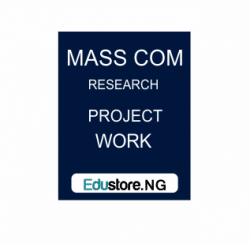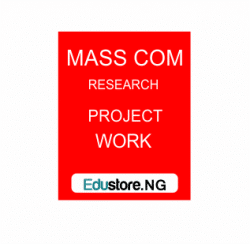The Impact Of The Media In Checking Economic Crime
(a Case Study Of Efcc Activities)
ABSTRACT
This research was designed to assess the impact of the media in checking economic crime in Nigeria. This study specifically examined how the Economic and Financial Crimes Commission (EFCC) through the media (Thisday and Sun newspapers) arrested and persecuted individuals found wanting in money laundering, fraud etc. The researcher used content analysis research method. This method facilitated a proper measurement on the content categories of the newspapers mentioned above on their reportage on economic and financial crime. These content categories includes news, features, Editorial, front page and inside page. The unit of analysis includes frequency, prominence, depth of coverage and direction. Equally data was sourced and collected from relevant texts, journals, and EFCC Act 2004. The major findings of the study show that newspapers were very powerful tool in the assessment and checkmating of financial and economic crime in Nigeria between 2009 to 2010.
PROPOSAL
Assessing the Impact of the Media in Checking Economic Crime (A Case Study of EFCC Activities). This study is aimed at the impact the media has made in checking economic crime which has brought to the activities of EFCC in Nigeria. In selecting the medium to use, Thisday and Sun newspaper strategy is being adopted (i.e. the print media). The bases on which this study has is to determine how adequately these newspapers covered the EFCC activities between 2009 and 2010. The research will contain content analysis research method in carrying out the study. Three hypotheses will be formulated for the study.
The hypotheses both have null and alternative hypotheses. The newspaper industry is a specialized industry. It has a unique pattern of reporting based on inverted pyramid style. More national papers are reckoned with professional approaches to news gathering and reporting. There has always been strict compliance to the pattern of reporting in other to conform with the international standard in reportorial style. Any act of deviation from this style is a professional blunder.
From the foregoing assessment method put in place by the researcher, it will truly ascertain in the researcher’s appraisal work if the media has really help in its impact in checking and reporting economic crime.
TABLE OF CONTENTS
Title Page i
Approval Page ii
Dedication iii
Abstract iv
Acknowledgements v
Table of Contents vi
List of Tables viii
Proposal
CHAPTER ONE
INTRODUCTION
1.1 Background of the Study 2
1.2 Statement of the Research Problem 6
1.3 Objectives of the Study 7
1.4 Significance of the Study 8
1.5 Research Questions 9
1.6 Research Hypotheses 10
1.7 Theoretical Framework 11
1.8 Scope of the Study 13
1.9 Limitation of the Study 13
1.10 Definition of Terms 13
References 17
CHAPTER TWO
REVIEW OF THE LITERATURE
2.1 Source of Literature 18
2.2 Review of Relevant Literature 18
2.3 Summary of Literature 30
References 32
CHAPTER THREE
METHODOLOGY
3.1 Research Design 33
3.2 Area of Study 35
3.3 Research Population 35
3.4 Research Sample 36
3.5 Sampling Technique 37
3.6 Instrument of Data Collection 38
3.7 Method of Data Collection 39
3.8 Method of Data Analysis 39
3.9 Expected Results 40
CHAPTER FIVE
PRESENTATION AND INTERPRETATION OF FINDINGS
4.1 Data Presentation and Analysis 41
4.2 Analysis of Research Questions 46
4.3 Discussion of Results 47
CHAPTER V
SUMMARY, CONCLUSION AND RECOMMENDATION
5.1 Summary 50
5.2 Conclusion 53
5.3 Recommendations 54
Bibliography 56
LIST OF TABLES
Table 1: Population/Sample Table 35
Table 2: Extent of covering of news items 41
Table 3: Content categories of stories covered by the selected newspaper 42
Table 4: Nature of Story 43
Table 5: Direction of Stories 44
Table 6: Placement of news of both newspapers 45
DOWNLOAD COMPLETE WORK
DISCLAIMER:
- For Reference Only: Materials are for research, citation, and idea generation purposes and not for submission as your original final year project work.
- Avoid Plagiarism: Do not copy or submit this content as your own project. Doing so may result in academic consequences.
- Use as a Framework: This complete project research material should guide the development of your own final year project work.
- Academic Access: This platform is designed to reduce the stress of visiting school libraries by providing easy access to research materials.
- Institutional Support: Tertiary institutions encourage the review of previous academic works such as journals and theses.
- Open Education: The site is maintained through paid subscriptions to continue offering open access educational resources.




